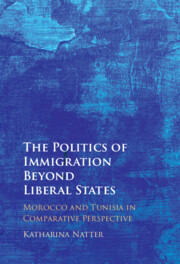Book contents
- The Politics of Immigration Beyond Liberal States
- The Politics of Immigration Beyond Liberal States
- Copyright page
- Dedication
- Contents
- Figures
- Tables
- Acknowledgements
- Note on the Text
- Abbreviations
- 1 Introduction
- 2 Theories on the Move
- 3 The Contrasting Cases of Morocco and Tunisia
- 4 Regime Continuity and Immigration Policy Change in Morocco
- 5 The Illiberal Paradox of Autocratic Policymaking
- 6 Regime Change and Immigration Policy Continuity in Tunisia
- 7 The Ambiguous Effects of Democratization
- 8 Immigration Politics and State Transformation
- 9 Conclusion
- Appendices
- Notes
- References
- Index
3 - The Contrasting Cases of Morocco and Tunisia
Published online by Cambridge University Press: 12 January 2023
- The Politics of Immigration Beyond Liberal States
- The Politics of Immigration Beyond Liberal States
- Copyright page
- Dedication
- Contents
- Figures
- Tables
- Acknowledgements
- Note on the Text
- Abbreviations
- 1 Introduction
- 2 Theories on the Move
- 3 The Contrasting Cases of Morocco and Tunisia
- 4 Regime Continuity and Immigration Policy Change in Morocco
- 5 The Illiberal Paradox of Autocratic Policymaking
- 6 Regime Change and Immigration Policy Continuity in Tunisia
- 7 The Ambiguous Effects of Democratization
- 8 Immigration Politics and State Transformation
- 9 Conclusion
- Appendices
- Notes
- References
- Index
Summary
Chapter 3 dives into the contrasting cases of Morocco and Tunisia. I introduce immigration policy developments in Morocco and Tunisia against the backdrop of both countries’ political regime dynamics. In particular, I provide concise accounts of Moroccan and Tunisian state formation trajectories and national identity narratives, as well as focused overviews of immigration and emigration patterns and policies from the early twentieth century until the end of 2020, including Morocco’s and Tunisia’s treatment of migrants during the first year of COVID-19. This offers the empirical backbone for the book.
Keywords
- Type
- Chapter
- Information
- The Politics of Immigration Beyond Liberal StatesMorocco and Tunisia in Comparative Perspective, pp. 44 - 78Publisher: Cambridge University PressPrint publication year: 2022

